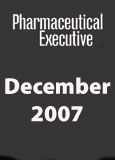After the Crash
Pharmaceutical Executive
For several decades, pharma got the message that promotion could make consumers want to use new drugs. The system didn't work with Pfizer's Exubera. That's surprising news, but is it bad news?
Sometimes surprises aren't all that surprising. Novelist and critic Walter Kirn put it nicely in the November issue of the Atlantic: "The abiding, distinctive feature of all crashes, whether in stock prices, housing values, or hit-TV-show ratings, is that they startle but don't surprise," he wrote. "When the euphoria subsides, when the volatile graph lines of excitability flatten and then curve down, people realize...that they've been expecting this correction. The signs were everywhere, the warnings clear, the researchers in rough agreement, and the stories down at the bar and in the office (our own stories included) revealed the same anxieties."

Patrick Clinton
Kirn was talking about something quite different, but he got me thinking about Pfizer's recent decision to dump Exubera—its inhaled-insulin blockbuster manqué, and perhaps the most disastrous product launch in recent memory. It was a jolt to hear that Pfizer was giving up. But a surprise? Hardly. We all knew about the clunky inhaler, the side effects, the high price, and the apparent lack of enthusiasm on the part of doctors and patients.
So why the feeling that something noteworthy has happened? And just as important, how did Pfizer get itself into this mess—writing off more than $2 billion and flagging itself as every biotech's top pick for Big Pharma Partner to Avoid at All Costs?
I've heard lots of reasons for Pfizer's bad choices: corporate arrogance, Hank McKinnell's autocratic management style, a dysfunctional decision-making structure, reluctance on the part of Pfizer's new leadership to upset a gigantic applecart when they'd just taken the reins. No doubt there's some truth in each of those explanations, but it's hard to believe that they could account for a gaff of this magnitude.
What could? Here's a speculation: The blockbuster era taught companies a lot of lessons—some good, some not so good. It committed them to big sales forces, encouraged them to expand the use of a drug past its original indication, focused them on patients as well as physicians, and lured them into a cavalier attitude toward costs. Maybe we should add another lesson to the list: It persuaded companies that they could create customer demand through promotion and advertising.
You can see how companies might fall into the notion. For decades, time after time, they were able to convert a point of differentiation or a potential benefit into demand and, ultimately, into sales. Every time they added sales reps, it upped sales. What conclusion would you come to?
And now, after serious promotion by the best in the business, the market has just said no to Exubera. Was it the failure of a campaign? Maybe. Or maybe after years of listening to nonstop critique of the industry, patients are starting to pay more attention to what they want and less to what pharma wants them to want.
Either way, it feels like the end of an era. But that's not necessarily a bad thing. In the past few years, pharma's critics have behaved as if the industry could get patients and docs to use anything, no matter how dangerous or worthless, just by promoting it enough. Part of the chorus of complaint directed at pharma these days is a rousing refrain of "You made us do it."
Well Pfizer, at the cost of a bit of embarrassment and a couple of billion in write-offs, has provided a solid counter-example. I don't know if patients made a good choice in avoiding Exubera. But they clearly made it themselves. And that, perversely enough, is good news for pharma.
Patrick Clinton
Editor-in-chief

FDA Outlines Updated Requirement for Placebo-Controlled Trials in Vaccine Research
May 21st 2025In an article recently published by The New England Journal of Medicine, FDA higher-ups Vinay Prasad, MD, MPH; and Martin A. Makary, MD, MPH, wrote that any new COVID-19 vaccine must now be evaluated in placebo-controlled studies.
Addressing Disparities in Psoriasis Trials: Takeda's Strategies for Inclusivity in Clinical Research
April 14th 2025LaShell Robinson, Head of Global Feasibility and Trial Equity at Takeda, speaks about the company's strategies to engage patients in underrepresented populations in its phase III psoriasis trials.
Beyond the Prescription: Pharma's Role in Digital Health Conversations
April 1st 2025Join us for an insightful conversation with Jennifer Harakal, Head of Regulatory Affairs at Canopy Life Sciences, as we unpack the evolving intersection of social media and healthcare decisions. Discover how pharmaceutical companies can navigate regulatory challenges while meaningfully engaging with consumers in digital spaces. Jennifer shares expert strategies for responsible marketing, working with influencers, and creating educational content that bridges the gap between patients and healthcare providers. A must-listen for pharma marketers looking to build trust and compliance in today's social media landscape.